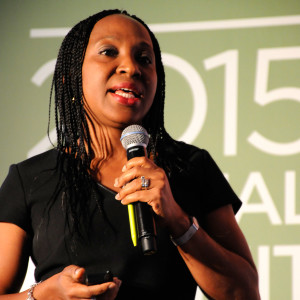Innovations in Inclusion
Digital banking is rapidly increasing banks’ outreach to the unbanked, a segment disproportionately made up of women. This panel explored innovative strategies employed by GBA members to reach women by using alternative distribution channels.
Key Points
- Diamond Bank sees financial inclusion as a growth market — with the right model.
- The bank’s savings strategy for low-income segments, focusing on women, is called the BETA Proposition. It is driven by the idea that women need increased availability and deeper usage of savings options.
- The program provides access to doorstep banking from mobile sales and service agents known as BETA Friends. Women who use the program are usually market traders who value saving through small regular deposits but don’t want to leave their market stalls. The program also takes into account women’s need for convenience, offering access to ATMs and branches in addition to BETA Friends agents. Accounts can be opened in 5 minutes from anywhere. Many participants make heavy use of mobile banking.
- Today the program is active in about 140 branches, and there are more than 700 BETA Friends operating in total. 250,000 BETA accounts have been opened, with N2.6 billion (US$13 million) in deposits. The previously unbanked are 29% of account holders, and women make up 36% of accounts. More than 90% of BETA account holders perform at least one transaction per month.

- The program did come with several challenges, including network connectivity and a high operational cost in terms of IT development and integration. There are also regulatory and operating environment issues.
- Diamond is piloting a commitment savings account that targets users who have a specific goal they are saving toward. They are also planning a micro lending platform for business or personal needs.
- 53% of BancoEstado’s customers are women, including 41% of microentrepreneurs and 20% of small business customers. They have grown their female customer base by 25% since 2009.
- Demand accounts, checking accounts and credit card accounts have seen particularly robust growth.
- The bank recently started the Crece Mujer program after recognizing that women were underrepresented in entrepreneurship. They tend to generate a lower income than men, likely because they work in lower-income industries that have more flexible work schedules. They also turn to entrepreneurship out of a need to support their families.
- BancoEstado found that women need more access to the financial system, education on management competencies, and access to social and commercial networks. To increase the number of women customers at the bank, BancoEstado offers a number of tailored financial and non-financial offerings, including trainings and networking events. They also have a test prospective entrepreneurs can take before they come to the bank so they can be sure they have everything they need to apply for their chosen offerings and see where they stand in terms of management/financial literacy.
- After 7 months in operation, 47,000 women were registered through the program, and 12,000 were registered with the web community.

